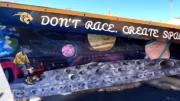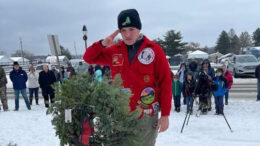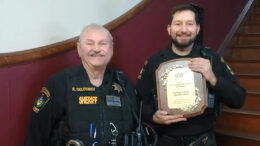How to burn, what to burn and when to burn within the city limits dominated the agenda at Oil City Council’s meeting on Thursday.
At issue is a dilemma facing the Oil City Fire Department in its response to neighbors’ complaints about what are legal and acceptable outdoor burning issues.
“There are issues with complaints about fire and smoke conditions, even as most people are burning 100% legally,” said the city’s fire chief, Mark Hicks.
Hicks said the department is getting blamed for failing to respond to those complaints, most of which have to do with what are accusations of excessive smoke, despite the fires being legal.
“I’m tired of the fire department being in the middle of neighborhood disputes. We are not the referees. Our job is to protect,” said the chief.
A big part of the problem is the city’s lack of details pertaining to outdoor burning.
Although the city follows the 2015 International Fire Code, it does not contain specifics about burning materials, enforcement and more, according to Hicks.
“We cannot enforce smoke conditions,” said the chief. “That is a civil matter between neighbors…. And we don’t identify what can and cannot be burned.”
Hicks said some complaints are justified because they deal with using an open fire – for example, to dispose of garbage.
“We’ll take care of those. … But, bonfires, charcoal fires, fire pits – that type of thing is not an unlawful act. The majority of people are doing everything correctly and we are making them put those out because of a smoke or other complaint,” he said.
When the firefighters do not order a fire to be extinguished, there are repercussions for the fire department, said Hicks.
“The neighborhood perception is then that we are doing nothing,” he said.
Hicks asked council to consider moving from an informal and confusing policy to an ordinance that outlines what can be burned, when the materials can be burned and what enforcement measures should be in place.
One material he noted should not be included as allowable are leaves because of typically heavy smoke issues.
On that topic, City Manager Mark Schroyer said the city’s inclusion in a state-directed recycling program requires that leaves be recycled. The city provides that service.
Hicks noted banning all burning within the city would be “the easy answer,” but he did not recommend that move. Such a decision would eliminate items such as the homecoming bonfire and First Night controlled fires, he said.
“I would assign a couple days a week for larger fires, with a permit,” he said. “That would not include a hot dog fire or … recreational fire. … And list things like shingles and tires that cannot be burned. Now, there is nothing on paper on what is allowed to be burned.”
Council members agreed to pursue a city burning ordinance and referred the issue to the city solicitor.
In a related matter, Hicks told council the state Department of Environmental Protection had given preliminary approval to the fire department’s request to do controlled burns for two abandoned homes on Clearfield Street.
The department has razed homes in that fashion in years past.
A speeding issue
Citing speeding and congestion issues, the couple asked council to consider installing speed bumps or additional stop signs on the city street.
Schroyer said the installation of either speed bumps or additional stop signs created “legal issues,” as they required street studies and approvals from other agencies.
He suggested greater enforcement efforts, the temporary location of “your speed is …” lighted signs or the application of street decals.
Chris Sporer offered that three-dimensional crosswalk strips that are painted on a city street have proved effective in slowing traffic. The 3-D walks are prevalent in Canada.
Kathy Bailey, manager of the city’s Main Street program, said the ARTS Oil City organization is considering public art projects and noted “the 3-D painted crosswalks is certainly a possible topic for future discussion.”
Mayor Bill Moon said council would work with the police department and public works department to explore ways to assist the East Fourth Street neighborhood.
In other business:
– Council approved the hiring of Tanner J. Malek, of Oil City, as a part-time city police dispatcher.
– The Oil City Elks Lodge was given permission to temporarily close part of Sycamore Street today to hold an outdoor dinner to coincide with the Main Street program’s final Music on the Square event.
Road closure signs will be put up from 3 to 9 p.m. The lodge held similar outdoor dinners on July 22 and Aug. 27.




























